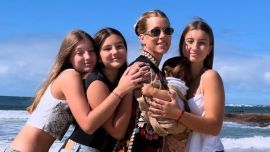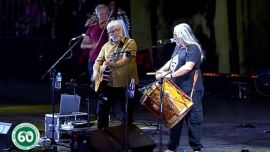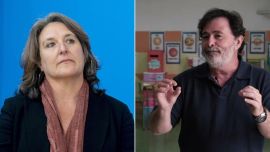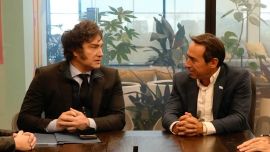Leaving Kabul: from fear to a new life of uncertainty
Focus Afghanistan | diplomacy | refugee | taliban | France asociado con x x
Paris, France | AFP | Monday 8/23/2021 - 09:57 UTC-5 | 916 words
PICTURES BY FARSHAD USYAN
by Joris FIORITI / Aymeric VINCENOT / Emmanuel DUPARCQ
A snap decision that left no room for hesitation. A few belongings grabbed, a hazardous road transfer, hours of anxious waiting. And then evacuation by air to a future that may be more secure but remains uncertain.
Afghans, who have escaped from Taliban-controlled Kabul and reached safety in Paris with the help of the French authorities, have told of their extraordinary last hours in Afghanistan marked by fear for their lives and perilous journeys from homes to embassy and then to the airport.
All expressed deep emotion over relatives who remain in Afghanistan and anxiety after arriving in a new country with almost no personal possessions or money.
But they were adamant there could be no question of staying in Afghanistan under the new regime.
"When we arrived at the airport, we were stuck for more than an hour. Both sides of the buses were overcrowded. People were trying to get inside our buses and enter the" facility which remains under control of the US military, said Mohammad, whose real name like other Afghans interviewed for this story has been withheld for security reasons.
"Then the French started to tell the Americans, pointing at people – 'She is with us, he is not. He is with us, she is not.' After entering the airport, we felt safe."
'Don't want people to leave'
For Maryam, the most traumatic part was reaching the French Embassy in Kabul, from where authorities could transfer people to the airport, as Taliban members outside pushed her back and one of them even beat her with his Kalashnikov.
"I was crying on the road when someone saw me from the French side. That is when they opened the door to us," she said.
It was the same for Abdullah, 32, an employee with a foreign media organisation, who had a French visa along with his eight-months pregnant wife but had to get through several checkpoints on his way to the embassy.
"Coming from home to the French Embassy was very difficult because there were Taliban everywhere in the city. They were checking every vehicle, every bag. There were long waits. You had to get the permission of their commander, they would shout at me: 'Why are you going to France?'"
"It was a scary moment for me. I was thinking that they would arrest me. They don't want people to leave Afghanistan," Abdullah said.
'Find your son'
But even now safely in France, the agony is far from over for Maryam, who made it to the Embassy with two of her three children but not her husband, a former high-ranking official in the previous administration who refused to leave over fears he could be killed in cold blood in the street.
Her husband and eldest son went to Mazar-i-Sharif in the north and then headed for neighbouring Uzbekistan for which both had a visa.
"My husband refused to go with us, he said he would get killed by the Taliban. They are on the road to [the Uzbek capital of] Tashkent. But when will I see them again?"
Omar, 20, an employee of the French Embassy in Kabul, has reached Paris but agonises over the fact that his parents have been left behind and they now face threats over his departure and past work.
"My parents tried to come to the embassy but they [the Taliban] slapped my father and my mother and they had to go back home. Now they threaten my family. They came to our home and they told my parents. 'Find your son or we will kill you'."
Mohammad said that despite the guilt he now feels, he had no option but to leave.
"My brother is there, my father is there, my sister is still there," he said. "She has a cancer. I was taking her every month for chemotherapy to Pakistan. But I left them. I had no choice, no choice! When the Taliban came in 1996, I was there, they put me in jail. I don't want the same to happen to my children."
Three miles in three hours
Jibran, who says being a driver for a foreign company made him a target for the Taliban, left with seven passports for him, his wife and five children and just 2,000 afghanis – around 20 euros in his pocket.
"We were very scared, very afraid," he said.
"I left Afghanistan with only the clothes I was wearing and with my family. I came straight away from the office. I just locked my home and left. We're happy to start a new life, but we are starting from zero."
Massoud, a photojournalist in Jalalabad, the main city of eastern Afghanistan, managed to get out with his wife and four children, against the odds.
He was in Kabul when the Taliban entered the city.
His family jumped into a car in Jalalabad and managed to make the three-hour drive to join him and get to the French embassy. They did not even have a spare diaper for their two-and-a-half-month-old child.
Over five long kilometres (three miles), they were then transported to the airport under French escort, at night, surrounded by armoured 4x4s carrying French police and soldiers, who were themselves escorted by rebel vehicles.
The constant checks meant it took some three hours to get to the airport, more than double the time it would have taken on foot.
"Very quickly, Taliban stopped us. I saw people trying to enter the buses. It lasted 15 or 20 minutes," Massoud said. "I was very worried we would be attacked. There was a lot of tension in the bus. Nobody was saying a word."
A French military plane flew the Afghans to a French base in the United Arab Emirates which Paris is using as a hub for evacuations.
And then a passenger plane took them from Abu Dhabi to the French capital.
But with one battle won, a whole new one begins.
related news
by Joris Fioriti, Aymeric Vincenot & Emmanuel Duparcq, AFP





















Comments